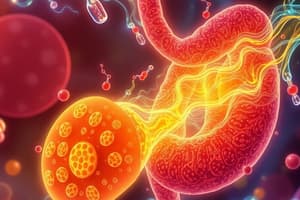Podcast
Questions and Answers
What is the main function of salivary alpha-Amylase during carbohydrate digestion?
What is the main function of salivary alpha-Amylase during carbohydrate digestion?
- To initiate the breakdown of proteins
- To neutralize stomach acid before entering the small intestine
- To hydrolyze glycosidic bonds between monosaccharides
- To break down starch into smaller oligosaccharides (correct)
Which enzyme is responsible for hydrolyzing lactose into its monosaccharide components?
Which enzyme is responsible for hydrolyzing lactose into its monosaccharide components?
- Maltase
- Sucrase
- Lactase (correct)
- Isomaltase
What types of dietary carbohydrates are primarily metabolized to monosaccharides?
What types of dietary carbohydrates are primarily metabolized to monosaccharides?
- Oligosaccharides, Starch, and Disaccharides
- Starch, Sucrose, and Cellulose
- Lactose, Glucose, and Fructose
- Starch, Sucrose, and Lactose (correct)
Which enzyme does NOT attack alpha-1,6 linkages during carbohydrate digestion?
Which enzyme does NOT attack alpha-1,6 linkages during carbohydrate digestion?
Where in the digestive system does the majority of carbohydrate digestion occur?
Where in the digestive system does the majority of carbohydrate digestion occur?
Which final product of carbohydrate digestion is NOT a monosaccharide?
Which final product of carbohydrate digestion is NOT a monosaccharide?
In which parts of the digestive system is the majority of dietary sugar absorbed?
In which parts of the digestive system is the majority of dietary sugar absorbed?
What mechanism allows the completion of carbohydrate digestion at the intestinal mucosal lining?
What mechanism allows the completion of carbohydrate digestion at the intestinal mucosal lining?
Which statement is true about glycogen as a dietary carbohydrate?
Which statement is true about glycogen as a dietary carbohydrate?
What is the primary method by which D-Galactose, D-Glucose, and D-Fructose are transported into intestinal mucosal cells?
What is the primary method by which D-Galactose, D-Glucose, and D-Fructose are transported into intestinal mucosal cells?
What happens when there is a specific disaccharidase deficiency?
What happens when there is a specific disaccharidase deficiency?
What occurs to alpha-amylase in the stomach due to high acidity?
What occurs to alpha-amylase in the stomach due to high acidity?
What is the role of bicarbonate in the small intestine during carbohydrate digestion?
What is the role of bicarbonate in the small intestine during carbohydrate digestion?
What effect do undigested carbohydrates have in the large intestine?
What effect do undigested carbohydrates have in the large intestine?
What role does sodium (Na+) play in the absorption of monosaccharides in the intestinal mucosal cells?
What role does sodium (Na+) play in the absorption of monosaccharides in the intestinal mucosal cells?
How do monosaccharides exit the mucosal cells after absorption?
How do monosaccharides exit the mucosal cells after absorption?
What is a consequence of bacterial fermentation of remaining undigested carbohydrates in the large intestine?
What is a consequence of bacterial fermentation of remaining undigested carbohydrates in the large intestine?
What is the primary reason for osmotic diarrhea in cases of abnormal disaccharide degradation?
What is the primary reason for osmotic diarrhea in cases of abnormal disaccharide degradation?
Which characteristic describes the transport systems for monosaccharides in the intestinal mucosa?
Which characteristic describes the transport systems for monosaccharides in the intestinal mucosa?
What is NOT a factor involved in the active transport of monosaccharides into mucosal cells?
What is NOT a factor involved in the active transport of monosaccharides into mucosal cells?
What primary function does GLUT-7 serve in the body?
What primary function does GLUT-7 serve in the body?
Which GLUT transporter is primarily responsible for glucose transport in neurons?
Which GLUT transporter is primarily responsible for glucose transport in neurons?
How does GLUT-4 activity change in response to insulin?
How does GLUT-4 activity change in response to insulin?
Which GLUT transporter is involved in the transport of glucose against its concentration gradient?
Which GLUT transporter is involved in the transport of glucose against its concentration gradient?
Which GLUT isoform is abundant in red blood cells and the brain?
Which GLUT isoform is abundant in red blood cells and the brain?
In which tissue is GLUT-7 predominantly expressed?
In which tissue is GLUT-7 predominantly expressed?
What is the transport mechanism associated with Na+-Monosaccharide Cotransport System?
What is the transport mechanism associated with Na+-Monosaccharide Cotransport System?
Which GLUT isoform is primarily responsible for glucose uptake from blood into cells under high glucose conditions?
Which GLUT isoform is primarily responsible for glucose uptake from blood into cells under high glucose conditions?
Which GLUT isoform is considered insulin-responsive?
Which GLUT isoform is considered insulin-responsive?
What is the primary transport mechanism of glucose by GLUT transporters?
What is the primary transport mechanism of glucose by GLUT transporters?
What type of transport system specifically transports D-fructose?
What type of transport system specifically transports D-fructose?
What is the main treatment for lactose intolerance?
What is the main treatment for lactose intolerance?
Which compound is known to inhibit the Na+-Dependent Monosaccharide Cotransport System?
Which compound is known to inhibit the Na+-Dependent Monosaccharide Cotransport System?
Which of the following is NOT a hereditary defect related to monosaccharide transport?
Which of the following is NOT a hereditary defect related to monosaccharide transport?
What is typically measured in the breath to diagnose carbohydrate malabsorption?
What is typically measured in the breath to diagnose carbohydrate malabsorption?
What results from a deficiency in brush border enzymes?
What results from a deficiency in brush border enzymes?
In which population is lactose intolerance most prevalent?
In which population is lactose intolerance most prevalent?
What type of transport system is utilized for the exit of monosaccharides from epithelial cells?
What type of transport system is utilized for the exit of monosaccharides from epithelial cells?
What is the recommended treatment for Isomaltase-Sucrase deficiency?
What is the recommended treatment for Isomaltase-Sucrase deficiency?
What does cytochalasin B inhibit with respect to monosaccharide transport?
What does cytochalasin B inhibit with respect to monosaccharide transport?
Flashcards are hidden until you start studying
Study Notes
Overview of Carbohydrate Digestion
- Digestion begins in the mouth with starch.
- Major dietary carbohydrates: Starch, Sucrose, Lactose.
- Digestive enzymes convert carbohydrates to monosaccharides.
- Stomach acid inactivates salivary alpha-amylase, halting carbohydrate digestion temporarily.
- Carbohydrate digestion completes before contents reach the duodenojejunal junction.
- Principal digestion sites: Mouth and intestinal lumen.
- Brush border enzymes digest sucrose, lactose, and starch products.
Enzymatic Breakdown
- Endoglycosidases and glycosidases play key roles in breaking down oligosaccharides and polysaccharides.
- Final digestion products: D-glucose, D-galactose, and D-fructose.
- Enzymes synthesized in intestinal mucosa include:
- Isomaltase, Maltase, Sucrase, Lactase for disaccharide cleavage.
Monosaccharide Absorption
- Absorption occurs mainly in the duodenum and upper jejunum.
- Monosaccharides transported into mucosal cells via active transport, involving sodium ions.
- Na+-Dependent Cotransport System specific for D-galactose and D-glucose.
- Na+-Independent System transports D-fructose by facilitated diffusion.
Transport Mechanisms
- Monosaccharides exit epithelial cells through Na+-independent transport.
- Specific defects in disaccharidase can lead to osmotic diarrhea and flatulence due to undigested carbohydrates.
- Common transporters: GLUT-1 to GLUT-14, facilitating glucose transport:
- GLUT-1: Found in RBCs and brain.
- GLUT-2: In liver, kidney, pancreatic β cells.
- GLUT-3: Main glucose transporter in neurons.
- GLUT-4: Abundant in adipose tissue and skeletal muscles; insulin increases activity.
- GLUT-5: Primarily involved in fructose transport.
Intestinal Disorders and Diagnostics
- Lactose intolerance affects over half of adults, especially among Black and Asian populations.
- Diagnosis involves Oral Tolerance Tests and H2 Gas Measurement in breath.
- Specific disaccharidase deficiencies can lead to malabsorption and osmotic diarrhea.
Key Functions of GLUT Transporters
- GLUT-2 balances glucose transport based on blood levels.
- GLUT-4 is insulin-responsive, enhancing glucose uptake during high levels.
- GLUT-7 mediates glucose transport within the endoplasmic reticulum.
Studying That Suits You
Use AI to generate personalized quizzes and flashcards to suit your learning preferences.




